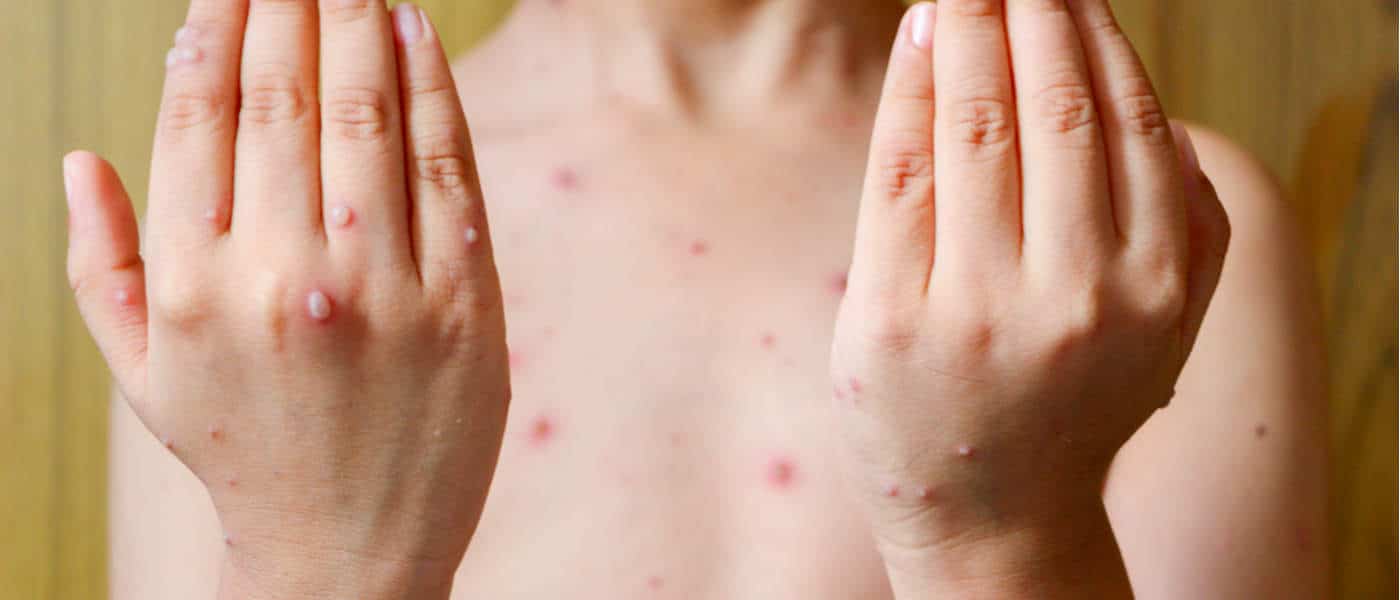
What is chickenpox?
Usually an illness that takes effect during childhood, chickenpox is a very common disease. It is very rare to get chickenpox twice, so 90% of adults are immune because they have had it previously[1]. Symptoms are uncomfortable for those affected; however, measures can be taken for these to be reduced.
Rash symptoms
The first visible evidence of infection is a breakout of red spots, generally appearing 1 to 3 weeks after being exposed to chickenpox. These begin to blister as they fill with fluid and have the potential to spread around the body. The spots will scab over at different rates, meaning more may appear while others are seeming to heal.
Chickenpox becomes infectious 48 hours after these symptoms first develop, with the contagious period coming to an end when the spots have crusted over after approximately 5 days.[2] During this time it is essential that you or your child are kept away from school, work or nursery, as it is highly likely you would infect anyone you come into contact with who has not previously had chickenpox.
Other symptoms of chickenpox
Symptoms are not limited to the chickenpox rash, as sufferers may also experience:
- Feeling sick and generally unwell
- Aches and pains throughout the body
- Headaches
- A high temperature exceeding 38°C
- Lack of appetite[3]
Treatment
Chickenpox clears itself without the need for any extra treatment, but there are ways to reduce discomfort caused by the symptoms.
Painkillers such as paracetamol can be used to ease symptoms, however it is safer to avoid ibuprofen and other non-steroidal anti-inflammatory drugs (NSAIDs), as they may cause adverse skin reactions.
Cooling creams and gels help to reduce irritation caused by the rash. These can be bought at pharmacies and do not have any risks associated with them.
Chlorphenamine is a stronger medicine that reduces itching from spots and is available over the counter at a pharmacist or can be prescribed by a GP. This is an oral medication that can be taken by anyone over the age of 1.[4]
Chickenpox vaccination information
The chickenpox vaccine allows the body to produce antibodies which protect against the varicella roster virus which causes the disease.
The vaccine is recommended to some healthcare workers, and those who are in close contact with a person with a weakened immune system, as this will help to reduce the spread of the chickenpox virus.
2 doses are required to be taken 6 weeks apart, with the vaccine becoming effective 6 weeks after the second dose is administered[5].
Advice for travellers
Many airlines will not allow passengers to travel with
chickenpox, so ensure you check with the airline before attempting to fly. It
is likely that holiday plans will be interrupted if a child is suffering from
chickenpox.
[1] NHS inform https://www.nhsinform.scot/illnesses-and-conditions/infections-and-poisoning/chickenpox#about-chickenpox
[2] NHS chickenpox page https://www.nhs.uk/conditions/chickenpox/
[3] Taken from both NHS websites
[4] Taken from both NHS websites
[5] Vaccination UK https://travelvaccination.co.uk/vaccination/varilix-chicken-pox/

Article last reviewed on 13/08/2019 by:
Denise Chalkley RN, RM, RHV, BSc, AMFTM RCPS (Glas)
Clinical & Operations Director for Travel Medicine
Denise is an associate member of the Faculty of Travel Medicine, and a freelance lecturer at the Royal College of Physicians and Surgeons in Glasgow for the Faculty of Travel Medicine. She also lectures at the University of Hertfordshire teaching immunisations, tuberculosis, sexual health and travel medicine.





